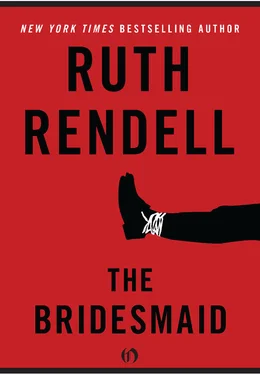Ruth Rendell - The Bridesmaid
Здесь есть возможность читать онлайн «Ruth Rendell - The Bridesmaid» весь текст электронной книги совершенно бесплатно (целиком полную версию без сокращений). В некоторых случаях можно слушать аудио, скачать через торрент в формате fb2 и присутствует краткое содержание. Год выпуска: 2010, Издательство: Open Road Integrated Media LLC, Жанр: Триллер, на английском языке. Описание произведения, (предисловие) а так же отзывы посетителей доступны на портале библиотеки ЛибКат.
- Название:The Bridesmaid
- Автор:
- Издательство:Open Road Integrated Media LLC
- Жанр:
- Год:2010
- ISBN:нет данных
- Рейтинг книги:3 / 5. Голосов: 1
-
Избранное:Добавить в избранное
- Отзывы:
-
Ваша оценка:
- 60
- 1
- 2
- 3
- 4
- 5
The Bridesmaid: краткое содержание, описание и аннотация
Предлагаем к чтению аннотацию, описание, краткое содержание или предисловие (зависит от того, что написал сам автор книги «The Bridesmaid»). Если вы не нашли необходимую информацию о книге — напишите в комментариях, мы постараемся отыскать её.
The Bridesmaid — читать онлайн бесплатно полную книгу (весь текст) целиком
Ниже представлен текст книги, разбитый по страницам. Система сохранения места последней прочитанной страницы, позволяет с удобством читать онлайн бесплатно книгу «The Bridesmaid», без необходимости каждый раз заново искать на чём Вы остановились. Поставьте закладку, и сможете в любой момент перейти на страницу, на которой закончили чтение.
Интервал:
Закладка:
Fee wanted to know whether Christine would do her hair if they came round for supper on Sunday. She had a fancy for ash blonde highlights. Usually Philip wouldn’t have known anything about Christine’s appointments and engagements, but he had overheard her telling her friend on the phone that she was going out at six on Sunday to do a perm for an old lady who was housebound with arthritis. Fee said okay, she’d call back a bit later when Christine was in, and Philip had to say that was all right, thought he thought that if Senta hadn’t phoned by then, he wouldn’t be able to keep himself from rushing to it and seizing the receiver.
And this in fact happened, for Senta didn’t phone but Fee did and he suffered the same hope and destruction of hope all over again. She hadn’t phoned by midnight, when at last he went to bed.
On Saturday afternoon he drove to Tarsus Street. The old man in the woman’s raincoat had obtained from somewhere a wooden trolley or barrow on which were piled his possessions, stowed into plastic carriers. These were arranged like cushions and were in gaudy cushion colours: Tesco red, Marks and Spencers’ green, Selfridge’s yellow and the blue and white of Boots the Chemist. The old man reclined on top of them, like an emperor in a chariot, eating a sandwich of something greasy in white bread, on which his fingers made black prints.
He waved the sandwich at Philip. He had never looked so cheerful. His open-mouthed grin showed greenish carious teeth. “See what I got meself with your more than generous gift, governor.” He kicked the wooden side of the barrow. “I’ve got me own transport now, and what’s more, it runs on shanks’s pony.”
After that, Philip could hardly avoid giving him a pound coin. He was entitled perhaps to something in return. “What’s your name?”
The reply came a little cagily and it was indirect. “They call me Joley.”
“Are you always about here?”
“Here and Caesarea”—he pronounced it “Si-saria”—“and over to Ilbert.”
“Do you ever see a girl come out of that house?”
“Kid with grey hair?”
Philip thought it a bizarre way to describe Senta but he nodded.
The old man stopped eating. “Not the fuzz, are you?”
“Me? Of course I’m not.”
“I’ll tell you one thing, governor, she’s in there now. She come home and went in there ten minutes back.”
Without shame, he held out his hand. Philip didn’t know whether to believe him or not, but he gave him another pound coin. A flicker of hope that the front door might have been left open once more was soon dispelled, but when he looked down into the area he saw that the shutters had been folded back a little way. By climbing over the low plaster wall of the steps and squatting down on the concrete, it was possible to see into her room. Looking into it after two weeks deprivation—except for dreams, except for those—hastened his heartbeat, he could feel the blood drumming. The room was empty. Over the wicker chair hung her silver dress and a pair of lilac-coloured tights, worn and discarded, for they still held, faintly, the contour of her legs and feet. The bed was still made up with purple cover and pillowcases.
This time he didn’t knock on the door. The old man was watching him, grinning, though not unsympathetically. Philip said good-bye to him and “See you,” though he now doubted whether he would ever see him again. He drove home, telling himself not to return, to bear it, to contemplate life without her, to soldier on without her. But, although he didn’t mean to do this, he made his way up to his bedroom on dragging feet and there, having pushed the chair against the door, lifted Flora out from the cupboard. Her face, her neat crimped hair, her remote smile and mesmerised eyes no longer recalled Senta to him. For all that, he had a feeling new and alien to him. He wanted to smash her, break her to pieces with a hammer, and stamp on those pieces, grinding them to dust. For someone who hated violence in all its forms, these were unwelcome, shameful desires. He simply put Flora back in her hiding place. Then he lay face-downwards on the bed and, to his own surprise and shame, found himself beginning a dry-eyed painful sobbing. He wept without tears into the pillow, wadding the linen against his mouth in case Christine should come upstairs and hear him.
It was halfway through Sunday when he gave up hope. Fee was there, having arranged for Christine to do her highlights in the afternoon. And Cheryl was at home, affording Philip his first sight of her since her return from Cornwall. But she wasn’t there for long. Having eaten or picked at the rather better than usual lunch Christine had provided, roast chicken with Paxo stuffing, reconstituted potato, and real fresh runner beans, she got up from the table and five minutes later left the house. Philip she had asked, when she was briefly alone with him, to lend her five pounds. He had to say no, he hadn’t got five pounds, adding, perhaps pointlessly, that she couldn’t want money on a Sunday. He sat at the table, with two halves of tinned peaches in a glass dish in front of him, and thought, I will never see Senta again, this is it, all over, the end, it is over. The frightening thing was that he couldn’t imagine how he was ever going to get through another week of it. Would next Sunday come and would he be here alive and surviving? Would he actually survive the torture of another week of this?
When the dishes were done, Christine and Fee took over the kitchen. Christine never charged her daughters for doing their hair but she did allow them to pay for the cost of the preparations she used. Now she and Fee engaged in argument as to how great a proportion of this cost Fee should be allowed to pay.
“Yes, but, dear, you got us all that nice ham and the strawberries and cream and I’ve only paid you for the loaf,” Christine was saying.
“The strawberries were a present, Mum, my pleasure, you know that.”
“And doing your highlights is my pleasure, dear.”
“I’ll tell you what then, you tell me the price of the ash blond tint, and I’ll want conditioner, so you can count that in, and the bit of mousse you use, and take away whatever the ham was—one twenty-two it was—and I’ll give you the difference.”
Philip was sitting in the living room, looking at the Sunday Express, not reading it but pretending to, with Hardy on his lap. Christine came in with the PG Tips tin she kept small change in.
“Do you know, I could have sworn there was a good seven pounds fifty in here before I went away and now it’s down to thirty pee!”
“I haven’t been making raids on it,” he said.
“I wish I’d looked in it on Wednesday. I keep wondering if it happened yesterday afternoon while you were out and I popped round the block with Hardy and didn’t lock up. I know I should have locked up, but I still think of this as a nice neighbourhood. I was only gone ten minutes, but you know that’s quite long enough for someone to come in and take a quick look round and help themselves to what’s going. Some poor person down on their uppers and desperate, I expect, I can sympathise, there but for the grace of God, I always say.”
Philip thought he knew very well who the poor person, down on her uppers and desperate, would be. The theft had happened just before lunch, not yesterday. Once he would have cared, would have known he must do something, at least would have communicated what he knew to Christine. Now he was concerned for no one but himself. But he emptied his pockets, giving what change he had to his mother. Briefly he wondered where Cheryl was now, what dealing she was involved in with the seven pounds fifty. What could you buy with such a miserable sum? Not smack, not grass, not crack. A bottle of whisky? That, certainly. Some sort of solvent? He couldn’t see his sister as hooked on glue sniffing.
Читать дальшеИнтервал:
Закладка:
Похожие книги на «The Bridesmaid»
Представляем Вашему вниманию похожие книги на «The Bridesmaid» списком для выбора. Мы отобрали схожую по названию и смыслу литературу в надежде предоставить читателям больше вариантов отыскать новые, интересные, ещё непрочитанные произведения.
Обсуждение, отзывы о книге «The Bridesmaid» и просто собственные мнения читателей. Оставьте ваши комментарии, напишите, что Вы думаете о произведении, его смысле или главных героях. Укажите что конкретно понравилось, а что нет, и почему Вы так считаете.











